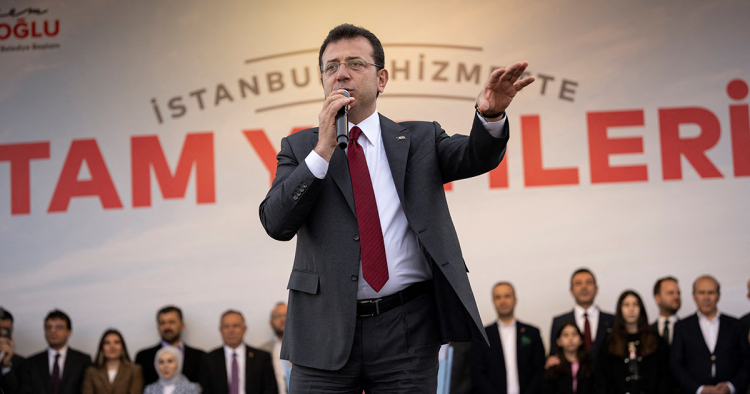Marine Le Pen, leader of France’s far-right National Rally, was convicted of embezzling EU funds and barred from running for office for five years, effectively disqualifying her from the 2027 presidential race. Meanwhile in Turkey, Ekrem İmamoğlu, mayor of Istanbul and President Recep Tayyip Erdoğan’s most formidable rival, was arrested on corruption charges and jailed, just as he was poised to become the opposition’s presidential candidate. Both Le Pen and Turkish officials are now pointing to each other to justify their own actions. Le Pen claims her conviction is politically motivated, likening it to Erdoğan’s crackdown on rivals. Turkish officials, in turn, argue that prosecuting a political rival does not necessarily mean the judiciary is politicized, pointing to Le Pen’s conviction as evidence that corruption cases involving opposition figures happen in Western democracies too.
Both cases have upended the electoral prospects of major political figures, but the similarity ends there. According to international rankings, France remains a liberal democracy with an independent judiciary. Marine Le Pen’s conviction stems from a 2016 anti-corruption law — one she herself supported — meant to end France’s long-standing tolerance of political corruption. The ruling was based on extensive evidence and grounded in a clear legal framework, and she was convicted through due process in a democracy with an independent judiciary.
İmamoğlu, on the other hand, was silenced by a regime that uses the courts as a political weapon. Turkey is a textbook case of competitive authoritarianism, where power is concentrated in Erdoğan’s hands and the judiciary is routinely deployed to neutralize political threats.
Turkey’s judiciary has long been subject to political influence, but under Erdoğan this politicization has reached new heights. Since 2010, Erdoğan has systematically packed the courts with loyalists. After the failed coup attempt in 2016, this process accelerated dramatically. Thousands of judges and prosecutors were purged and replaced by ones aligned with Erdoğan’s agenda, effectively turning the judiciary into a tool of political control. Broad anti-terrorism laws are routinely used to silence critics, criminalize dissent, and prosecute opposition figures on vague and arbitrary charges.
The effort to derail İmamoğlu’s political trajectory was tightly coordinated. A few days before his arrest, İmamoğlu’s alma mater, Istanbul University, revoked his diploma — disqualifying him from the presidency under Turkish law, which requires a university degree — for supposed violations of Higher Education Board rules. Just one day later, he was arrested on corruption charges.
The process has been riddled with irregularities. In one case, a judge who refused to issue a harsh sentence was abruptly transferred. In another, a university dean who validated İmamoğlu’s diploma was forced to resign. Time limits have been ignored, and the penalties sought are wildly disproportionate — far harsher than in comparable cases. İmamoğlu’s lawyers say they were not even allowed access to the case file, learning key details from pro-Erdoğan pundits on TV and social media instead. They argue the case rests entirely on anonymous witnesses, not concrete evidence.
This is not law enforcement, it is political warfare dressed up as legal procedure. And İmamoğlu is not the first. Selahattin Demirtaş, the former co-leader of the pro-Kurdish Peoples’ Democratic Party, and another challenger to Erdoğan, has been imprisoned since 2016 after opposing Erdoğan’s bid to become executive president. Similarly, Ümit Özdağ, leader of the far-right Victory Party and a critic of Erdogan, was detained in January 2025 on charges of inciting public hatred through anti-refugee social media posts, after previously being investigated for allegedly insulting the president.
Le Pen’s disqualification followed the law; İmamoğlu’s was engineered through politics. Equating the two cases hands autocrats like Erdoğan exactly what they want: a talking point to legitimize their crackdowns. By pointing to legal actions in Western democracies, they argue that jailing political rivals is simply standard legal procedure — not political persecution. This false equivalence not only distorts reality in places like Turkey, it also chips away at public trust in democratic institutions elsewhere. When democratic governments are framed as no different from authoritarian regimes, faith in the independence of courts and the rule of law erodes, even in the very democracies that uphold them.
Gönül Tol is Senior Fellow at MEI and the author of Erdogan’s War: A Strongman’s Struggle at Home and in Syria.
Photo by Yasin Akgul/AFP via Getty Images
The Middle East Institute (MEI) is an independent, non-partisan, non-for-profit, educational organization. It does not engage in advocacy and its scholars’ opinions are their own. MEI welcomes financial donations, but retains sole editorial control over its work and its publications reflect only the authors’ views. For a listing of MEI donors, please click here.













